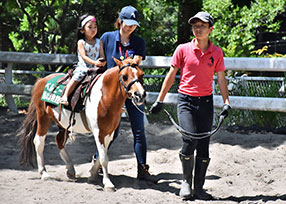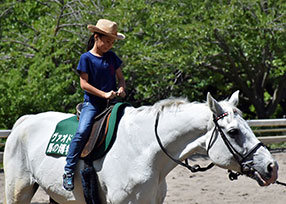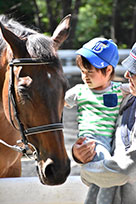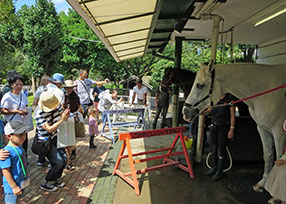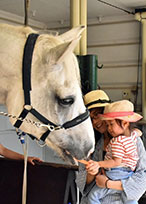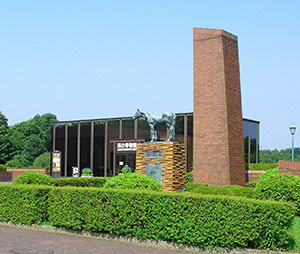
At the Equine Museum of Japan, our permanent and temporary exhibitions introduce visitors to horse-related history, folklore, arts, artifacts, and sports. We also have large-scale special exhibitions in the spring and autumn.
At our Pony Center, visitors can learn about the care of horses while befriending various breeds including native Japanese horses.
Yokohama and Horse Racing
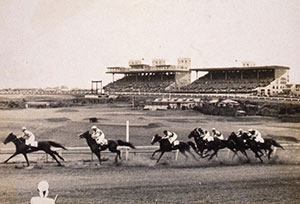
Western-style horse racing in Japan began in Yokohama in the 1860s. Following the completion of Negishi Racecourse in 1866, horse racing took place there from 1867 to 1942, a total of 76 years. Negishi Racecourse began as an entertainment venue for foreign residents in Yokohama, but eventually became a bustling social arena that welcomed the Japanese elite as well. It also served as the model for other racecourses built in Japan.
The Heritage of Equine Culture
Equine culture began about 5,000 years ago when people in Central Asia invented horse bits, revolutionary devices that allowed humankind to control horses. This culture entered Japan during the Kofun period (3rd – 7th century CE).
Japanese Equine Culture
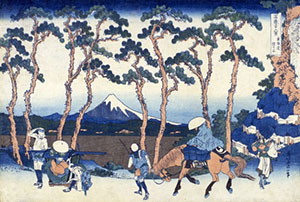
Japanese equine culture originally developed in association with the noble and warrior classes. Harnesses, paintings, prints and crafts with horse motifs illuminate the high status of horses in society.
Art and Horses
Horses have long been a favorite theme of artists. Our collection includes work by artists such as Kusumi Morikage, Gassan, Édouard Manet, Marc Chagall and Pablo Picasso.
Knowing Horses
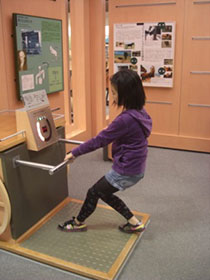
Horsepower measuring device
The ancestors of horses appeared about 55 million years ago during the Cenozoic era. In Gallery 4, visitors can follow the history of the horse from the evolution of their distant ancestors to domestication. Visitors can also learn about the physiology and ecology of horses, and about horse breeds around the world. Also, you can learn how to tack up and measure your own horsepower.
Pony Center
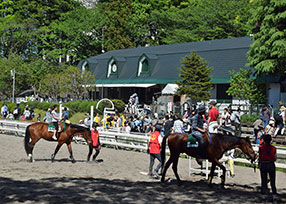
We periodically hold events such as Horse Riding Day and Carrot Time. Seasonal events in Spring and Autumn are Children’s Day with Horses and Meet the Horses. These events offer visitors a chance to interact with horses. (The schedule and exact contents of events are subject to change due to weather and the condition of our horses.)
Horse Riding Day
Most third Sunday of the month. (Please see HERE for details.)
Carrot time
Every Saturday 1:30 p.m. to 1:45 p.m.
Children's Day with Horses
Spring
Meet the Horses
Autumn
Hours and Admission
Museum
- Closed days
- Closed on Monday; New Year’s Holidays (The Museum is OPEN when a public holiday falls or is observed on a Monday. Instead, the following Thursday will be closed.)
- Museum hours
- 10:00 a.m. to 4:30 p.m. (Entry permitted until 4:00 p.m)
- Museum admission
-
Adults\100
Youths 7-17\30
Children 6 and underFree
*Admission is subject to change during special exhibitions.
Park
- Closed days
- Closed on Mondays and the New Year’s holidays. When Monday is a public holiday, the park will be opened on Monday and closed on the following day.
- Park hours
- 9:30 a.m. to 5:00 p.m.
- Park admission
- Free
- Getting Here
-
- By Bus
- From Negishi Station, take city bus No. 21 for Sakuragi-cho station.
- From Sakuragi-cho Station, take city bus No. 21 for Shiden Hozonkan Mae.
- From Yokohama Station, Hinode-cho Station, or Isezakichoja-machi Station, take city bus No.103 for Negishidai, Negishi Station or Honmoku Shako mae.
- Please get off all buses at Takinoue.
- By Car
- No parking space here.
- (※Public toll parking lots are next to the park)
- Contact Us
-
Equine Cultural Affairs Foundation of Japan,
1-3 Negishidai, Naka-ku, Yokohama 231-0853

